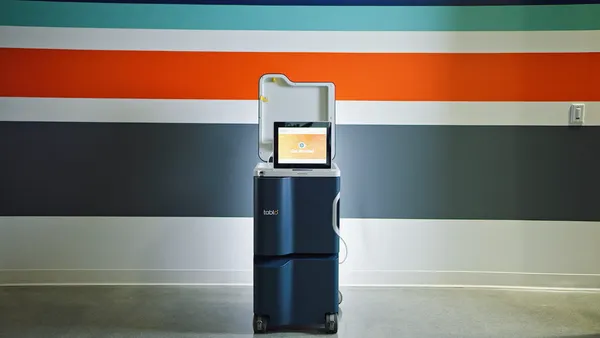It was a busy year for FDA's expert advisory committees, called on to tackle many of its biggest medical device questions in 2019, new and old.
The Circulatory System Devices Panel met in June in reaction to a concern that emerged in late 2018 after a meta-analysis found a late mortality signal in patients receiving paclitaxel-coated devices. Other topics, like the benefit-risk profile of transvaginal mesh, had been hashed out in numerous meetings over the past few decades.
Repeated meetings aren't necessarily a negative, said Diana Zuckerman, president at the National Center for Health Research since 1999.
"We can't think of these public meetings as a bad outcome ... We wish that people weren't being harmed by breast implants, by mesh, by Essure, and so on. But if they are being harmed, then I'd much rather there be a public meeting about it then to have it covered up," Zuckerman said. "For breast implants especially, it's made an enormous difference in terms of public awareness."
Of all the device meetings this year, none seemed to draw as much attention as a March meeting on breast implant safety. It came amid growing recognition of a type of lymphoma that can develop around the devices called breast implant associated anaplastic large cell lymphoma, or BIA-ALCL, as well as a vast collection of potentially related symptoms called breast implant illness.
In one of the clearer impacts from an advisory panel this year, FDA followed up months later by asking Allergan to initiate a worldwide recall of certain textured implants, and issuing a draft guidance outlining a black box warning and patient safety informed consent checklist to be included with the implants.
Raylene Hollrah, a breast cancer and BIA-ALCL survivor who has advocated that FDA improve breast implant safety, said that while the advocacy community has made significant strides with regulators and plastic surgeons this year, language in FDA's draft guidance regarding breast implants' risks is “way too vague.” Comments on that proposal are due Monday.
"I am definitely not anti-implant," she said. "I want women to have a choice but I want it to be a safe one."
Better transparency on the chemicals and metals contained in breast implants remain at the top of advocates' list, Hollrah said.
Eight months after the breast implants meeting, FDA asked its Immunology Devices Panel to weigh immunological responses to devices based on different metal elements in implants.
Zuckerman said that meeting represented the first time she'd heard high-level FDA scientists and officials link certain immunological responses to devices and vocalize a need to better understand what causes that link, and which patient and product factors increase risk.
"It was very interesting because it wasn’t specific to any particular product," Zuckerman said. "[When] there's an advisory committee on one product, there always seems to be a lot of caution about suggesting immunological responses to implants," adding that panelists seemed "much more open-minded about these issues than they usually are."
One undercurrent across many meetings was inadequacy of post-approval studies and spotty adverse event reporting, leading to incomplete data with which panelists could form opinions. Once a device is commercialized, it's very difficult to complete postmarket studies, Zuckerman said.
Even if those postmarket studies and other forms of surveillance are happening, "it's too late for the patients being harmed," Zuckerman said. "Most of us would much rather know that some implant that's going into our body was adequately tested before it was put in our body. Not that it might be tested a year or two later."
Here's a snapshot of the biggest device advisory committee meetings and the current state of affairs.
FDA's medical device advisory committee meetings
| Date | Subject | What's the status? |
|---|---|---|
| November | Immunologic reactions to metal implants, use of dental amalgam | FDA's Immunology Devices Panel recommended that manufacturers disclose the composition of medical devices, that more information be gathered on immunological responses to metal-containing implants, and that dental professionals move away from using mercury-containing amalgams. |
| November | Ethylene oxide sterilization, duodenoscope-related infections | FDA selected winners of its sterilization innovation challenges and launched a voluntary pilot program to speed the transition to new sterilization methods; FDA cleared the first fully disposable duodenoscope and a duodenoscope with a sterile, disposable elevator component. |
| September | Medical device cybersecurity | FDA's Patient Engagement Advisory Committee recommended development of "a high standard of outreach" for both manufacturers' and regulators' communication of vulnerabilities to patients across all types of channels. |
| June | Paclitaxel devices' late mortality signal | Manufacturers have implemented labeling put forth by FDA acknowledging the late mortality signal; the agency is working with device makers on collecting more robust data through randomized trials and registries. |
| May | Reclassification of surgical staplers, absorbable collagen-based hemostatic devices | FDA issued a proposed rule moving surgical staplers for internal use from Class I to Class II; the General and Plastic Surgery Devices Panel recommended moving absorbable collagen-based hemostatic devices from Class III to Class II. |
| March | Breast implant-associated lymphoma and illness | FDA prompted Allergan to begin a voluntary, worldwide recall in July of heavily implicated implant models; FDA in October proposed adding a black box warning to breast implants and adding a patient decision checklist. |
| February | Safety and efficacy of transvaginal mesh implants to treat pelvic organ prolapse | FDA ordered the two remaining market players (Boston Scientific and Coloplast) to remove their surgical mesh products indicated for transvaginal repair of pelvic organ prolapse from the market and rejected premarket approval applications for new products with that indication to enter the market. |













